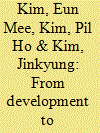| Srl | Item |
| 1 |
ID:
113945


|
|
|
|
|
| Publication |
2012.
|
| Summary/Abstract |
South Korea, the newest member to join the OECD's Development Assistance Committee, has signaled that it will become a major donor of official development assistance (ODA). Having had its own history of being a large recipient of ODA, South Korea claimed that it will provide aid from the recipient's perspective. Using panel data covering twenty-three years (1987-2009) and 154 recipient countries, we examine whether South Korea's ODA reflects the recipient nation's humanitarian needs more than the donor's interests. We ask three questions: (1) What are the major determinants of South Korea's ODA allocation? (2) Has South Korea's ODA policies changed over different time horizons-that is, years, political regimes? (3) Does South Korea exhibit different standards of allocating ODA for different groups of recipient countries? We find that South Korea provides more aid to higher-income developing countries with higher growth rates, which shows the tendency o t serve the donor's economic interests. When we examine the data by time periods, we do not find significant differences over decades or political regimes. However, when we reexamine the data based on recipients' income levels, we find that the relationship between per capita income of the recipient country and ODA allocation is negative only for the middle-income or lower-middle-income group recipients and positive for the rest. This finding suggests the possibility that South Korea's ODA policy may have a dual-track structure.
|
|
|
|
|
|
|
|
|
|
|
|
|
|
|
|
| 2 |
ID:
123110


|
|
|
|
|
| Publication |
2013.
|
| Summary/Abstract |
As an emerging donor of Official Development Assistance (ODA), the South Korean government has announced that it will provide a 'South Korean Model of Development Cooperation'. This paper explores how the South Korean development experience from the twentieth century can be transformed into an alternative for development cooperation in the twenty-first century. The early aid management system in South Korea contributed to the bureaucratic capacity-building that was necessary for the installation of the developmental state. In its quest for industrialization, the authoritarian developmental state in South Korea maintained autonomy vis-à-vis foreign donors, foretelling the 'country ownership' principle in today's global norms of ODA. However instructive the South Korean experience may be, it will not work as a 'one size fits all' model for the twenty-first century development due to such fundamental changes in the global political economy as the WTO regime and democracy promotion. In this regard, South Korea's own double transition of economic liberalization and democratization offers another important lesson. Therefore, we suggest a South Korean 'alternative' that respects both the global norms for development cooperation and the national democratic aspirations. It would be a democratic developmental state whose autonomy is more deeply embedded in civil society and whose capacity further expands human capabilities.
|
|
|
|
|
|
|
|
|
|
|
|
|
|
|
|